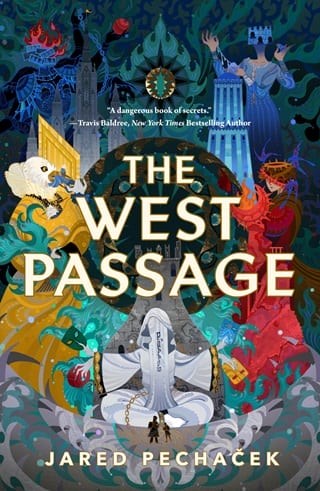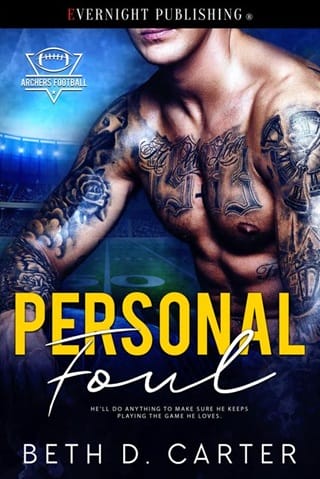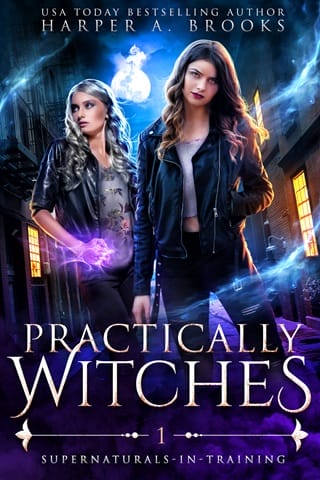33. Yarrow Continues on Foot and Feeds a Baby
33. Yarrow Continues on Foot and Feeds a Baby
Like every part of the palace except the four Passages, the courts of Blue were difficult to traverse. In Grey, to get to Madrona's district, you had to cross the Court of the Tower to the northern wall; go in at the side door; walk up a staircase to a long gallery; follow that to a crumbling mezzanine in a court where half of a huge stone face glowered; pick your way along the mezzanine, which grew crumblier every year; take the left-hand door in the far wall; go down a short corridor, and come out on the parapet of the wall known as Handmaidens' Fall. You would end nearly back where you started, only higher up.
Once, there had been more direct routes through Grey, but collapsed arches or toppled walls now blocked them, and new structures had been built over, around, or through those ruins. Then those structures had collapsed in their turn, and so on. Now the clearest paths lay through disused rooms or ancient galleries where once only members of the Lady's court had been permitted. There were apologies to make upon entry, or in some rooms you had to walk along only one wall so as not to disturb people who had been dead for an era and weren't in the room anyway.
Blue was newer and more populous, but it still resisted the traveler. All of its white-plastered walls looked the same; every door was the same cerulean blue; new buildings had been constructed straddling others or jutting out at strange angles. It seemed made to confuse, where Grey had only lapsed into confusion. Also, the land around Blue was wrinkly with valleys and hills. Yarrow had never known that. From a distance, Blue's rooflines baffled the eye and made the district seem like a single smooth hill. But the same primeval forces that had carved the South Passage seemed to have crumpled Blue up like a napkin. More than once, Yarrow entered a building by one door, then exited by another many floors below, or the reverse, so that after an hour or two of walking she was exhausted and had made hardly any progress at all.
Every room or corridor was empty of people. Unsure of the protocol, she whispered a ritual apology each time, even though the emptiness was that of a crow-picked skull. In Grey and Yellow, emptiness was still cluttered. Decaying furniture, shredded tapestries, moldering ornamentation, abandoned miracles: it was an airless, overstuffed quality. In Blue there was nothing at all, not a stick of furniture or a film of dust. Even the windows were empty, wooden shutters open wide without even a lattice. The whole place seemed scoured. In one room she found a dead fly, and the shock of seeing anything at all nearly made her scream.
After that, she began to find other things. Not furniture, decoration, or miracles: concatenations of metal and wood, full of struts and gears and pulleys. These things must be machines. Yarrow had never seen machines, but Grith had told her of them: great mechanical beasts with flesh and innards of clockwork, Grith said. Moved by water, wind, or muscle, Grith said.
As to what they did, well, there were straightforward ones, and there were less straightforward ones. Yarrow saw what had to be looms, though they were nothing like the looms on which Arnica wove. She saw large presses for fruit and mills for grain. And she saw a curious machine that seemed to make pages and pages of writing. Jasper's library kept a few books like that, but Yarrow had always thought they were the work of a particularly finicky scribe.
But in one tall, narrow atrium was a vast machine turned by a creature: nothing but bulky greyish legs walking around and around a track, which its feet had worn smooth. Where something else might keep its genitals, this had a horizontal metal pole attached to the machine, transferring its motion to stacks upon stacks of interlocking gears, which filled the atrium up to the circle of winter-white sky at the top. The creature had to be a miracle; nothing else could be that tireless.
It was the first living (or quasi-living) thing she had seen since leaving the trees, and she stood a while and watched it. Where was everyone? Even Grey was not this empty.
Something rumbled underground, and the machine shuddered. The miracle did not cease walking. After a moment, chutes swung down from the machine's rotating sides, and several dozen spheres of clear jelly poured out. Yarrow skipped back, avoiding the splashes as the spheres burst around her. Each one left behind some object: from this one a wheelbarrow, from that one a sapling, from another a mirror. All around the walls were bins marked with symbols: wheelbarrows, trees, mirrors, lambs, potatoes, as if the things now piling up on the floor were to be sorted into them. But there was nobody to do the work, and at last the stream of spheres stopped. All around were useful things: if she had been heading back to Grey, Yarrow would have filled a wheelbarrow with whatever they needed there. The creature continued its walking, smashing a mirror with one foot, crushing a steel pot with another, snapping the neck of a bleating lamb, and so on. There was another lamb in the track, and Yarrow pulled it out of the way before the miracle got to it. It kept bleating, and the Lady started whining in time with it, so Yarrow left. The echoes of the lamb's cries followed her, and she shivered. Surely someone would be along for all of it eventually.
A long corridor and a rickety wooden staircase brought her out onto a broad walltop. The tower was very close now, and she had to lean back to see its top. A little tributary of the river wound past the foot of the wall and fell down a short cascade, where it turned a dented, rusty wheel. Yarrow closed her eyes against the keen wind and breathed deep. One got so used to stale air. The Lady squirmed and grunted, and Yarrow shushed her.
The other end of the walltop brought her into an enfilade of four rooms, each filled with machines. In the first, iron arms twisted sheets of metal into huge lantern-shapes like Servant folding laundry. The Lady hissed at the clanging and screeching, and Yarrow hurried on, following the lanterns as they rolled into the next room, where delicate silver fingers etched them with a hellebore flower. In the next room, a bronze fist stamped the Willow eye over the flower. In the final room, the lanterns were piling up. All the while the machines labored noisily on. One of the litanies said to avoid lanterns, and that was no problem for Yarrow. After a few more stairs, she shoved through a particularly stubborn door into a fan-shaped room.
She sighed with relief at the silence and the light. Here were many high windows, and the clamor of machines was muffled by many more cobwebs than any place she'd been in Blue. But there were still no furnishings, and the room was nearly empty. At its narrow end was a broad pedestal, or perhaps a dais, with a dusty curtain of brown velvet veiling its top. A rope hung to one side.
On Lady-day in Grey, the players presented their mystery plays on stages with curtains like this, and ropes to draw them. Refreshed by her time in the wind, Yarrow felt she had earned a break. There certainly weren't any players about, but the stage might have some cunningly painted scenery. That would be pleasant to look at. The Lady had lapsed into sullen sleep, so Yarrow tugged at the rope until, with a puff of dust and a sour smell, the heavy folds of the curtain drew up and the stage was revealed.
There was scenery, but it was a plain panorama of the palace with the five towers. It reminded Yarrow of the schoolhouse fresco, and she squirmed uncomfortably. Above it was a black hole like a chimney. There was a bit of a draft from it—very unpleasant, especially as the air made the scenery quiver as if the towers were twitching, pulsing, like things hatching. She was about to leave when a little body clattered out of the chimney onto the stage.
Was it— alive ? She edged closer. It was metal and wood, but was there any flesh ? She poked at it. No, it wasn't alive. She found fine black threads for moving it—only a puppet. Then it twitched and unfolded and stood. The blue costume it wore didn't look like anything she knew.
Yarrow leaned over the edge of the stage and looked up. In the chimney was an assemblage of iron gears, arms, strings—and more puppets dropping toward her. She stumbled back just as one hit the stage, followed by several more, clackety clack-clack . Then, grandly, a Lady in a black robe.
A tinkly little tune began. Yarrow peered around the back of the stage. More machinery, this for making music. A bellows began expanding and contracting, and a terrible, reedy imitation of a voice started up.
"Eh uh uh eh -eh-eh ay-ee ih eer," it said, and from the waving of the little blue-robe's arms, Yarrow could tell it must be the one talking. "Oo ah ah uh ai-ee eh oh uh ah ee-air-eh-ee."
It was an awful, incomprehensible racket. But Yarrow sat and watched, resting her feet and relieved to have some sound that, grating as it was, still wasn't the baby's crying. An argument, it sounded like, which was only resolved when the Lady herself spoke. Her voice was a gong, not loud but very deep and hollow. The whole group began an up-and-down motion while the panorama behind them rolled past, bringing Grey into closer view. And there they were joined by a tall bird-headed Lady in yellow and a turret-headed Lady in red. Yarrow flinched.
Was it—it couldn't be. Was it a story told by the Mothers?
Yes: the Hellebore Lady's defeat at Grey long, long ago. Not only had a story of the house been taken, it had been recorded . Though whatever machinery drove these puppets was not sacrilegious writing, it wasn't flesh, either. And worse than all of that, it was a grotesque parody of the actual tale. The Lady of Grey (at whom Yarrow couldn't quite look) was a bumbling noisemaker accompanied by three wimpled women who echoed whatever she said in voices even reedier and more terrible than the other puppets'. And in a complete departure from the truth, Hellebore took a lantern from within her robes and poured its light upon Grey, making it and its inhabitants stand still and listen to her. Then she sang: crystalline notes like a finger on a wineglass's rim.
The Lady and people of Grey capered stiffly and sang along to Hellebore's tune. They flapped about and rolled their tiny puppet eyes. Their horrible voices screeched in Yarrow's ears. At last they stopped and bowed to Hellebore, speaking words that were nonsense even compared to the rest.
That had certainly never happened. As the Mothers knew, the lantern light in its liquid form made you receptive, even pliant in mind as well as body, which was why the Hellebores had sent it out to unite the palace factions under their banner. There were other, less predictable effects, too, especially if it were diluted. Thankfully, once the Lady defied Hellebore, no lantern track had ever reached Grey Tower. After that era, successive dynasties found it useful, though by the dawn of Willow it must surely have been depleted. If the Hellebores had actually deployed it in Grey, the Mothers would remember.
Yarrow stood with fists clenched. So this is what Blue thought of them. This is what the palace thought of them, more than likely. Stiff, bumbling repeaters. Toys of Black. Fools, even. Their stories free for the taking, free for reworking, free for mocking the Lady and the Mothers and the house and everything . Here, where anyone could see them, where nobody could correct them, where nobody knew Blue was passing this brackish water off as wine.
The machinery came to a squealing halt, and every puppet went limp. She picked up the Lady, who was drowsily awake, and left. Yarrow's duty now was to show that Grey was nobody's puppet. They would see her guiding the new Lady of Yellow. They would know the long learning of the house was for some purpose.
Despite her determination, there was a very long way to go still, and she was very lost.
At last, tired and footsore, she found herself in a court of mown grass with an apple tree planted in its center—a living apple tree, very black and gnarled under the darkening sky. Beneath the tree was a stone, carved into no particular shape but smooth and polished: the oldest effigies of Grey were like that, too. Despite the cold and the scattering of snow, the tree still bore some puckered-up apples. Yarrow gathered a few. On the other side of the tree was a door: the only way out besides the way she'd come in. Through it was another bare room, this one long and narrow, its white ceiling plainly and simply vaulted. Slender windows on the far wall overlooked the spreading apron of Blue Tower, the teeth of Black, and the beacon of Red. As the blue of evening settled over the palace, amber lights sparkled here and there.
What with curfew, and funerals only taking place at noon, Yarrow had never been up high enough at night to see the beacon, nor close enough to see details of Red Tower's shape. The main mass of the tower was an irregular cone, bolstered by structures like tilted slabs of stone. At the pinnacle was a sort of husk, like half of a burst seedpod. Thin spines seemed to cover it, though she couldn't tell for sure in the dim light. In the cup of the husk, the beacon burned. It was a great flame, disastrously great: a conflagration that could devour all of Grey House in a moment, and it billowed and swirled like the costume of a player. But the light it cast was warm and homely. There was a song that spoke of Red Tower as the hearth of the palace. She could almost understand why.
Nearer, its lamps like a swarm of fireflies, Black Tower brooded. Its familiar shape was wrong, somehow. She felt as if she'd reentered a room to find that her cup had been moved a few inches. Ah , there was the difference: some windows at its pinnacle had lighted up. Normally, the top of the tower was as dark as anything, but there, where the Willow Lady was said to hold court, someone was awake.
Curious, but unconcerned, Yarrow went back to the corner where she had left her pack and ate a scant meal of two biscuits and an apple. The apple core was hollow and full of black mold, but the rest was acceptable. Fresh fruit was not to be disdained, however poor it might be. She took the baby out of the pack and laid her on the floor, then curled up next to her and tried to sleep. It was not easy. The loathsome eh eh ah ah of the puppets echoed in her mind. And Blue was the friendliest of the towers to Grey. Better the vast indifference of Yellow than this—this—this…
Yarrow slept.
The Lady's cries woke her in the night. Groggy and unthinking, Yarrow put her finger in the baby's mouth to quiet her and went back to sleep.
Around sunrise, Yarrow awoke with a sharp pain in her finger. She jerked upright. What a fool, to make such a mistake! The baby had to be shaken off. When she was finally detached, she ran to the corner and sulked. Yarrow's finger was mostly intact. The Lady had not done much more than break the skin: there were two tiny, bloody semicircles of teethmarks, but that was all. If Yarrow had been just a bit more deeply asleep, it is hard to say what would have happened.
"You little—" Yarrow began, stanching the wounds with the edge of her sleeve. What was a bad word she could use? Before she thought of one, the Lady began to wail. "I'm not feeding you. There's nothing here except me."
She started to sing the lullaby, but though the crying settled to a whimper, the Lady was, it seemed, too hungry to sleep. Yarrow gritted her teeth. After yesterday's success, she had assumed the lullaby would be of great help. Apparently, it had its limits.
"Here," she said, tossing the baby a fig. Her crying ramped back up, and she kicked the fig back to Yarrow. "Here," said Yarrow, throwing a biscuit over. Screaming with rage and hunger, the Lady ran to the biscuit and stomped it to pieces. "I hate you," said Yarrow. "I hate you so much."
They glared at each other, the one with more eyes than the other.
"This is not my role," said Yarrow. "I'm the Mother, not a mother. Why are you even here? Why didn't you stay in the tower? Why weren't you smashed ? I hate you. I hate you ."
The baby resumed crying, but Yarrow did not feel the least bit of regret. She picked up the wimple and, after chasing the Lady around the empty room for several minutes, captured her again and pinned her up tightly. The Lady did not stop crying, so Yarrow took a handkerchief from her sleeve and tied it around the small, loud mouth. This dampened, but did not entirely muffle, the noise. Yarrow jammed the Lady into her pack and ate her own breakfast. There was little left: the destroyed biscuit had been a loss she could ill afford.
The Lady would only eat flesh, and there was just one kind of flesh to give her. Yarrow took out the jar of honeyed meat and unstoppered it. The smell was sweet and delicious and heavy with rot, like the wine she had drunk at dinner in Grey House. There were five bits of meat inside: rather small, unfortunately, but if the Lady would accept a snack it might be enough until something better came along. She gave one chunk to the Lady, who ate it greedily, and wiped the honey off on the handkerchief before tying it back around the Lady's mouth.
Her injured finger throbbed more than she had expected, and the skin around it was red and beginning to burn. Was it infected? Or did Ladies have venom? She ripped up another handkerchief and bound the wound securely, but if something was seriously wrong, there was nothing more she could do for herself. There might still be a doctor in Blue somewhere, but the abandoned state of the courts so far did not inspire confidence.
Opening the outer door of the room, she went down a whitewashed staircase for several minutes until she reached a wide parkland of gently rolling grass, dotted with tall brown conifers. Stumps showed that this court was a source of lumber or firewood. Wandering here and there were cattle, nibbling at the grass. Their horns were tied with blue and yellow ribbons. Their gills flared and contracted as they breathed. They ignored Yarrow.
When she had got across the park, there was yet another white wall with a short staircase. Above it, Blue Tower filled the sky. Its three receding tiers were of marble the color of a cloud's shadowed side. Their parapets and windows were trimmed with a much darker stone that iridesced deep blue and bright gold. Despite the cold, vines bloomed all over its walls, and dark ivy coiled about it. Hummingbirds with yellow throats buzzed about, sipping nectar, and grey pigeons cooed in the niches and crevices. Seeing the birds, the Lady squalled, and Yarrow was forced to feed her another piece of meat. She seemed to have grown: the wimple restraining her was stretched tighter than it had been, and either Yarrow was very tired, or the pack was heavier as well.
At the top of the stairs, Yarrow found a broad terrace of marble tiles, interrupted here and there by short trees trimmed into cubes of grey sticks. Another planted terrace rose a distance away, and another, and another, curving around the tower and diminishing as they went, until they ended in a large portico that must be the entrance to the tower. Her heart sank. It was still so far away. But if she wanted directions, she needed to talk to someone, and there must be people in the tower proper. Yarrow resumed walking.
After a while she was quite warm. The sun was shining, and though a chill wind swept across the terrace, she was overheating in her dark cloak and gown. Her hand throbbed, too, and had grown red and swollen, with angry hot streaks running up her arm. Though no doctor, she knew enough to grasp that this was not good. She tied her last clean handkerchief around her arm just under the elbow, slowing the blood flow; that might keep infection at bay a little longer. Just until she got to the tower. She fed the Lady again; there were only two pieces of meat left. The Lady seemed to have gotten very heavy, and barely fit in the pack at all.
The roofs and lapis domes of Blue loomed over the first terrace but as she climbed to the second, she drew level with them. And when she stopped for breath on the third, she stood higher than at any point since leaving the train. Yarrow had come around the side of the tower and expected to see home across the South Passage. A blizzard had obscured it. Snow drifted against the outermost cloister and fell in pale showers from the dark canyon edge. The near roofs were blanketed too deeply: as she watched, one ridgepole snapped and collapsed in a puff of white. The walls tumbled after it, and the whole building slid into the Passage to rest with the other bones of the palace. A moment later, the noise of it echoed in Blue. The expanding storm swallowed the Passage and advanced.
Grey was not built for this, Yarrow thought. I am failing them. I have failed them. The house will be so cold and hungry. The orchards are dead. There will be no harvest. I am the last Mother of Grey, and I've failed.
She got up and walked. Heat throbbed along her aching arm: the handkerchief was not doing its job. The blizzard was moving toward Blue, and she was nowhere near shelter. That was just as well. If there was no more Grey, there need be no more Mother. And without Grey, she thought, without the Motherhood, I am nothing.
The first flakes reached her before she'd gone more than a dozen steps. A wave of bitter, bone-gnawing cold swamped her. She was ice, and her arm was fire, and her vision was going dark. Bile burned her throat. Heavy as effigies, her feet no longer moved. She dropped to her knees on the frozen stone, then onto her back. Snow piled against her side and her pack. The Lady squealed at the cold. Yarrow let her eyes close as above her the storm swallowed Blue Tower, where the windows glowed as its people lighted lamps against the dark.
 Fullepub
Fullepub 



